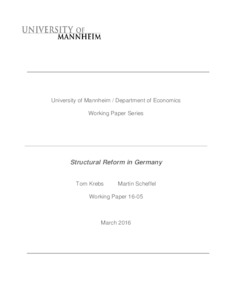|
Structural reform in Germany
Krebs, Tom
;
Scheffel, Martin
![[img]](https://madoc.bib.uni-mannheim.de/40516/1.hassmallThumbnailVersion/Krebs%20und%20Scheffel%2016-05.pdf)  Vorschau |
|
PDF
Krebs und Scheffel 16-05.pdf
- Veröffentlichte Version
Download (240kB)
|
|
URL:
|
https://ub-madoc.bib.uni-mannheim.de/40516
|
|
URN:
|
urn:nbn:de:bsz:180-madoc-405160
|
|
Dokumenttyp:
|
Arbeitspapier
|
|
Erscheinungsjahr:
|
2016
|
|
Titel einer Zeitschrift oder einer Reihe:
|
Working Paper Series
|
|
Band/Volume:
|
16-05
|
|
Ort der Veröffentlichung:
|
Mannheim
|
|
Sprache der Veröffentlichung:
|
Englisch
|
|
Einrichtung:
|
Fakultät für Rechtswissenschaft und Volkswirtschaftslehre > Makroökonomik u. Wirtschaftspolitik (Krebs 2006-)
|
|
MADOC-Schriftenreihe:
|
Department of Economics > Working Paper Series
|
|
Fachgebiet:
|
330 Wirtschaft
|
|
Fachklassifikation:
|
JEL:
E24 , E60 , J2 , J3,
|
|
Abstract:
|
This paper provides a quantitative evaluation of the macroeconomic, distributional, and fiscal effects of three reform proposals for Germany: i) a reduction in the social security tax in the low-wage sector, ii) a publicly financed expansion of full-day child care and full-day schooling, and iii) the further deregulation of the professional service sector. The analysis is based on a macroeconomic model with physical capital, human
capital, job search, and household heterogeneity. All three reforms have positive short-run and long-run
effects on employment, wages, and output. The quantitative effects of the deregulation reform are relatively
small due to the small size of the professional services in Germany. Policy reforms i) and ii) have substantial
macroeconomic effects and positive distributional consequences. Ten years after implementation, reforms
i) and ii) taken together increase employment by 1.6 percent, potential output by 1.5 percent, real hourly
pre-tax wages in the low-wage sector by 3 percent, and real hourly pre-tax wages of women with children by
2.7 percent. The two reforms create fiscal deficits in the short-run, but they also generate substantial fiscal
surpluses in the long-run. They are fiscally efficient in the sense that the present value of short-term fiscal
deficits and long-term fiscal surpluses is positive for any interest (discount) rate less than 9 percent.
|
 | Dieser Eintrag ist Teil der Universitätsbibliographie. |
 | Das Dokument wird vom Publikationsserver der Universitätsbibliothek Mannheim bereitgestellt. |
 Suche Autoren in Suche Autoren in
Sie haben einen Fehler gefunden? Teilen Sie uns Ihren Korrekturwunsch bitte hier mit: E-Mail
Actions (login required)
 |
Eintrag anzeigen |
|
|
